
Harvey Bernard Milk was an American politician and the first openly gay man to be elected to public office in California, as a member of the San Francisco Board of Supervisors. Milk was born and raised in New York, where he acknowledged his homosexuality as an adolescent, but chose to pursue sexual relationships with secrecy and discretion well into his adult years. His experience in the counterculture of the 1960s caused him to shed many of his conservative views about individual freedom and the expression of sexuality.

Daniel James White was an American politician who assassinated George Moscone, the mayor of San Francisco, and Harvey Milk, a member of the San Francisco Board of Supervisors, inside City Hall on November 27, 1978. White was convicted of manslaughter for the deaths of Milk and Moscone and served five years of a seven-year prison sentence. Less than two years after his release, he returned to San Francisco and later committed suicide.
This is a list of notable events in the history of LGBT rights that took place in the year 1978.

George Richard Moscone was an attorney and Democratic politician who was the 37th mayor of San Francisco, California from January 1976 until his assassination in November 1978. He was known as "The People's Mayor," who opened up City Hall and its commissions to reflect the diversity of San Francisco, appointing African Americans, Asian Americans, and gay people. Moscone served in the California State Senate from 1967 until becoming mayor. In the Senate, he served as majority leader. Moscone is remembered for being an advocate of civil progressivism.

The White Night riots were a series of violent events sparked by an announcement of a lenient sentencing of Dan White for the assassinations of George Moscone, the mayor of San Francisco, and of Harvey Milk, a member of the city's Board of Supervisors who was one of the first openly gay elected officials in the United States. The events took place on the night of May 21, 1979 in San Francisco. Earlier that day White had been convicted of voluntary manslaughter, the lightest possible conviction for his actions. The lesser conviction outraged the city's gay community, setting off the most violent reaction by gay Americans since the 1969 Stonewall riots in New York City.
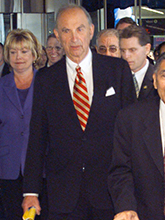
Quentin Lewis Kopp is an American attorney, politician and jurist. He served as a member of the San Francisco Board of Supervisors and in the California State Senate. Kopp ran unsuccessfully for mayor of San Francisco in 1979 against Dianne Feinstein. Kopp advocated for the extension of BART to SFO which was completed in 2003.

The San Francisco Board of Supervisors is the legislative body within the government of the City and County of San Francisco in the U.S. state of California.
Sister Boom Boom, also known as Sister Mary Boom Boom, was the drag nun persona of astrologer Jack Fertig. He was a prominent member of the Sisters of Perpetual Indulgence, a gay activist group founded in San Francisco in 1979.

The mayor of the City and County of San Francisco is the head of the executive branch of the San Francisco city and county government. The officeholder has the duty to enforce city laws, and the power to either approve or veto bills passed by the San Francisco Board of Supervisors, the legislative branch. The mayor serves a four-year term and is limited to two successive terms. Because of San Francisco's status as a consolidated city-county, the mayor also serves as the head of government of the county; both entities have been governed together by a combined set of governing bodies since 1856.
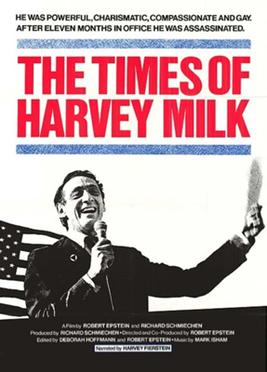
The Times of Harvey Milk is a 1984 American documentary film that premiered at the Telluride Film Festival, the New York Film Festival, and then on November 1, 1984, at the Castro Theatre in San Francisco. The film was directed by Rob Epstein, produced by Richard Schmiechen, and narrated by Harvey Fierstein, with an original score by Mark Isham.
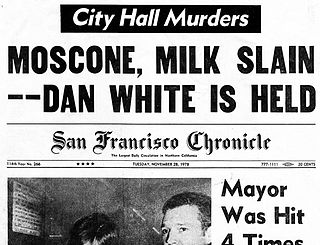
On November 27, 1978, George Moscone, the mayor of San Francisco, and Harvey Milk, a member of the San Francisco Board of Supervisors, were shot and killed inside City Hall by former Supervisor Dan White. On the morning of that day, Moscone intended to announce that the Supervisor position from which White had previously resigned would be given to someone else. White, angered, entered City Hall before the scheduled announcement and first shot Moscone in the Mayor's office, then Milk in White's former office space, before escaping the building. Board of Supervisors President Dianne Feinstein first announced Moscone and Milk's deaths to the media, and because of Moscone's death, succeeded him as acting mayor.
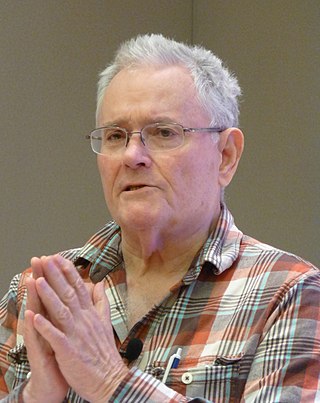
Harry Britt was an American political activist and politician in San Francisco. Britt was involved during the late-1960s in the civil rights movement when he was a Methodist minister in Chicago. He was first appointed to the San Francisco Board of Supervisors in January 1979 by Mayor Dianne Feinstein, succeeding Harvey Milk, who was assassinated in City Hall along with Mayor George Moscone by former Supervisor Dan White.
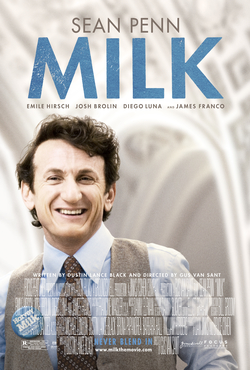
Milk is a 2008 American biographical drama film based on the life of gay rights activist and politician Harvey Milk, who was the first openly gay man to be elected to public office in California, as a member of the San Francisco Board of Supervisors. Directed by Gus Van Sant and written by Dustin Lance Black, the film stars Sean Penn as Milk, Josh Brolin as Dan White, a city supervisor, and Victor Garber as San Francisco Mayor George Moscone.

The 1977 San Francisco general elections occurred on November 8, 1977, for all 11 newly created electoral districts to be represented in the Board of Supervisors for the 1978 fiscal year, as well as the position of City Attorney, the position of City Treasurer and a roster of 22 propositions. It was the first time in San Francisco's history that Board elections were held on a districted basis rather than on a citywide at-large basis; in the November 1976 general election, voters in San Francisco decided to reorganize supervisor elections to choose supervisors from neighborhoods instead of voting for them in citywide ballots when they voted for Proposition T, which included the definition of the district boundaries.

The 1975 mayoral election was held to select the 37th mayor of San Francisco, and was held in two parts. In the November regular election, then-Speaker of the California State Assembly George Moscone placed first with conservative city supervisor John Barbagelata second and moderate supervisor Dianne Feinstein coming in third. Moscone and Barbagelata thus both advanced to the mandated runoff election in December where Moscone narrowly defeated the conservative supervisor by 4,400 votes, a margin of less than 1%.

The 1987 mayoral election was held to elect the 39th mayor of San Francisco. Dianne Feinstein, then the incumbent, had served as mayor since the 1978 assassination of mayor George Moscone and supervisor Harvey Milk and had been elected to full terms in 1979 and 1983, and was thus term-limited. Then-California State Assembly member Art Agnos came from behind to defeat Supervisor John Molinari, garnering nearly 70 percent of the vote.
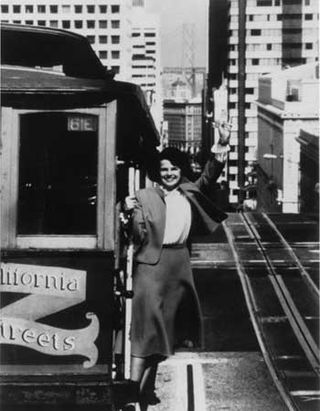
The mayoralty of Dianne Feinstein lasted from November 27, 1978, to January 8, 1988, while she served as the 38th Mayor of San Francisco. Feinstein gained the position following the Moscone–Milk assassinations, in which her predecessor, Mayor George Moscone, was killed by Dan White, a former member of the San Francisco Board of Supervisors. She was formally appointed to the position by the Board of Supervisors by a vote of six to two and inaugurated on December 4, 1978.
John Barbagelata was a San Francisco City Supervisor and 1975 mayoral candidate, when he narrowly lost to George Moscone. He was also the owner of a local real estate firm. As of 2020, he was the last Republican to be elected to the San Francisco Board of Supervisors, in 1973.
Peg's Place was a San Francisco lesbian bar (1950s–1988) and the site of an assault in 1979 by off-duty members of the San Francisco vice squad, an event which drew national attention to other incidents of anti-gay violence and police harassment of the LGBT community and helped propel an unsuccessful citywide proposition to ban the city's vice squad altogether. Historians have written about the incident when describing the tension that existed between the police and the LGBT community during the late 1970s.

The 1994 Oakland mayoral election was held on June 7, 1994 and November 8, 1994 to elect the mayor of Oakland, California. It saw the reelection of Elihu Harris.

















